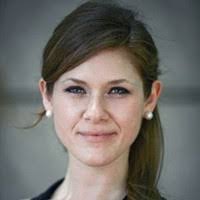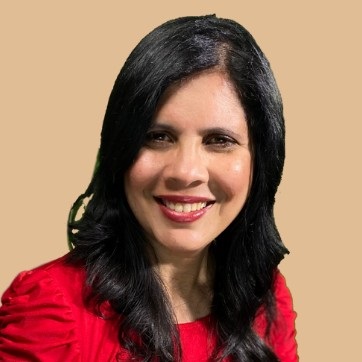[vc_row][vc_column][vc_column_text]Working in sales and marketing can mean a variety opportunities, projects, and challenges. In anticipation of our upcoming Women in Sales & Marketing event at Checkr, we chatted with several of our panelists to get a sneak preview.
Ginny, you’ve worked all over the world in countries like China, India, Vietnam, and Australia. How does that global perspective influence your product marketing work today?
 “For the one thing, I feel incredibly grateful to have travelled as much as I have in my early twenties. I come from a small town in Pennsylvania, and in high school I wrote a letter to my future self, saying that I wanted to live in a big city like ‘Cleveland or Pittsburgh.’ So to go from that to Beijing with a population of 21 million was an incredible, formative experience for me.
“For the one thing, I feel incredibly grateful to have travelled as much as I have in my early twenties. I come from a small town in Pennsylvania, and in high school I wrote a letter to my future self, saying that I wanted to live in a big city like ‘Cleveland or Pittsburgh.’ So to go from that to Beijing with a population of 21 million was an incredible, formative experience for me.
When taken through the lens of product marketing, at the end of the day, people are just people. And people want to consume things that are relevant to them. That are personal to them. That come in a form of media that they like to consume. Know your audience. Make sure you’re doing your homework; do your research. If you’re not sure, test a hypothesis, and build from there.”
– Ginny Tonkin, Associate Product Marketing Manager at Instapage
Sarah, why do you feel that storytelling an important aspect of marketing? How can marketers find that ‘story’ element?
 “The core of successful marketing is about relating to your buyers, building that empathy for the challenges they face, and making a connection with them on a personal level. There is no better way of persuading people to buy something than by telling them a great story they can relate to. Stories aren’t always limited to customer stories – although those are always extremely valuable in highlighting use cases – but stories can be incorporated into every type of marketing messaging and interaction.
“The core of successful marketing is about relating to your buyers, building that empathy for the challenges they face, and making a connection with them on a personal level. There is no better way of persuading people to buy something than by telling them a great story they can relate to. Stories aren’t always limited to customer stories – although those are always extremely valuable in highlighting use cases – but stories can be incorporated into every type of marketing messaging and interaction.
The key to finding the right ‘story’ element is listening to your customers, understanding their pain points and then putting their experiences at the center of the narrative. As a marketer, you can join a sales call, run a survey, gather data from closed deals or just go out into the field and interact with real customers – that is the richest source of data any marketer can have.”
– Sarah Din, Senior Product Marketing Manager at SurveyMonkey
Cathy, what are you most passionate about in business development, and why?
 “You mean aside from being able to say the word ‘biz dev’ three times fast? I love my job because it’s all about creating long-term value for the business. Being able to think with the mindset of ‘will this create long term value for Yelp’ is so nifty because that question is inherently complex and hard to answer. You consult many stakeholders (marketers, salespeople, execs, interns…) while also leveraging industry knowledge, analytical skills, and soft skills. Overtime, you become a business athlete, being able to juggle multiple teams and answer multi-layer business problems.
“You mean aside from being able to say the word ‘biz dev’ three times fast? I love my job because it’s all about creating long-term value for the business. Being able to think with the mindset of ‘will this create long term value for Yelp’ is so nifty because that question is inherently complex and hard to answer. You consult many stakeholders (marketers, salespeople, execs, interns…) while also leveraging industry knowledge, analytical skills, and soft skills. Overtime, you become a business athlete, being able to juggle multiple teams and answer multi-layer business problems.
Another fun part about the job is you are constantly doing the two-way sale on new, strategic ideas (internally and externally). In my day job, internal selling is critical because some of the policies I champion give up revenue today in exchange for the growth of the business tomorrow. Not an easy task, but makes being in biz dev so exciting!”
– Cathy Chou, Growth Manager, Business Development at Yelp
Jeena, over the past 12 years, you have worked for Google in a variety of departments. What key skills have helped you the most as you tackle new challenges and roles?
 “In the last 12 years at Google, I’ve had the opportunity to work in multiple partnerships teams, driving business and product success for our advertisers, publishers and app developers. I’ve also worked in 3 cities, 2 countries, traveled extensively, and have stopped counting the number of times I changed desks!
“In the last 12 years at Google, I’ve had the opportunity to work in multiple partnerships teams, driving business and product success for our advertisers, publishers and app developers. I’ve also worked in 3 cities, 2 countries, traveled extensively, and have stopped counting the number of times I changed desks!
While moving teams, taking up new opportunities at work or in my personal life, my mantra has continued to be – always be learning, always be contributing. This mantra has helped me hone my skills and build new ones. Here are a few key skills that continue to help me make a positive contribution in whatever I do:
-
- Understand the product/service: Sounds like a no-brainer right? Have you ever bought a product/service offering where you didn’t fully trust someone’s description? Make a conscious effort to understand the product/service offering you are discussing with your partners/clients and go beyond the surface talk. Also, practice effective communication depending on the audience, and be mindful of what they are looking for.
- Be curious, offer solutions: If you notice something can be improved, and you’re curious why it’s not, ask. Also, don’t just limit yourself to the question. Also, look at offering solutions to tackle the problem.
- Look for collaboration, not competition: An effective collaboration can help bring together our collective skills and strengths, share resources and work towards a solution. This can have a long term impact across the organization. Over the years, I’ve worked with various cross-functional teams with different goals, to tackle different areas of opportunities for our business. And, we’ve had a more profound impact when we sought to collaborate with a common vision, rather than trying to solve the problems in silos.
- Share your skills/learnings: ‘How/Where can I help?’ – It’s the question that gives me an opportunity to share my learning with another person and be open to learning something new in the process.”
– Jeena James, Global Head of Brand Partnerships, Google Play at Google
Tickets for Women in Sales & Marketing are on sale now. Register here.[/vc_column_text][/vc_column][/vc_row][vc_row][vc_column][/vc_column][/vc_row]


